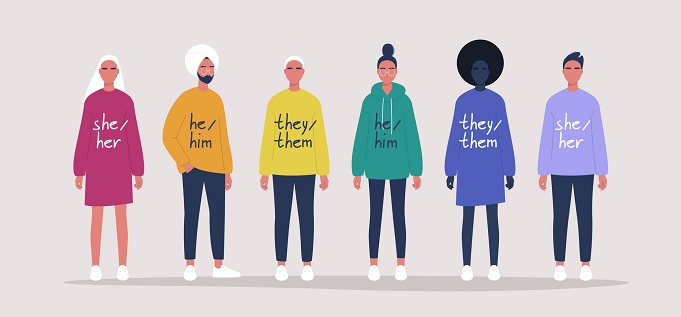Commentary: Why pronouns matter
By Lisa Eytel
April 5, 2022
You’ve most likely seen she/her/hers or some variation of this on people’s email signatures in recent months, but why is this important?
Pronouns are not inconsequential to me or many people within the LGBTQ+ community. My pronouns tell you that I do not live in the gender binary constructed by society. My pronouns may get you a bit confused because I have two listed. (How can you have two pronouns…?) My pronouns may tell you that I probably identify as some degree of queer, which subsequently “outs” me. My pronouns do not tell you what I look like though. They do not tell you the origins of my name or my sex. They also do not tell you about my sexual orientation. What pronouns do tell you is how to refer to me in the third person. They tell you a little bit about my gender identity. My pronouns, like everyone’s, are subject to change and are not up for debate.
Why I care so much
Making sure I can communicate my pronouns to others, particularly my students, and why do I ask for others’ pronouns?
I present as gender nonconforming. I identify as a genderqueer/gender nonbinary woman. This is complex. Sometimes it’s easier to just call myself a “butch” or “dyke” but that tells you about my sexual preferences and outward style choice more than my gender identity. I don’t feel like I totally fit in as a woman but I’m definitely not a man. I identify with many of the issues gender minorities face and also benefit from identifying within the realms of a cisgender person. But why does that matter? Why am I sharing this with my colleagues in academia?
Creating an inclusive classroom
It all boils down to creating an inclusive classroom. When our students feel comfortable and feel like they belong, they are more likely to learn and they are more likely to persist in higher education. Being comfortable in a classroom does not mean they are not challenged with material; it means they can express themselves wholly and share their perspectives without feeling ostracized. It means they feel like they can picture themselves existing in whatever academic/career field they choose to pursue. Creating space for your students to share their pronouns means you are recognizing the existence of people who live outside the binary or maybe change from one side of the spectrum to the other while they are a student in your class. Ignoring the fact that people exist beyond that binary by not creating space to share pronouns can lead to someone feeling like they do not belong and thus cannot succeed in your classroom. We know the logic here is flawed but it is also real. I am not a psychologist by training but I can tell you from experience this logic runs through every person’s mind who lives outside the binary.
Why I almost quit and what is misgendering?
I want to share why I almost quit my Ph.D. program. This was not because I did not feel “smart enough” or was burnt out or all the other reasons people consider leaving/do leave Ph.D. programs; this was because I was purposefully misgendered by a faculty member.
Misgendering is using the wrong pronouns and/or other gendered language for a person that does not match the person’s identity. Misgendering often happens to people who are transgender. It also happens to people who are nonbinary/genderqueer or people who simply present as gender nonconforming (the way they dress does not match the gender society dictates for them). Persistent misgendering is also one of the leading causes of depression and suicide among transgender and gender-nonconforming people. Misgendering someone is a microaggression if done by accident. It is a macroaggression if it is persistent.
During my second year, a month prior to my candidacy exam, a faculty member interrupted a conversation between a friend and me by saying “excuse me sir” directly to my face. This faculty member was fully aware of who I was and that I am not a man. When I corrected them by saying “I’m not a sir” I received the retort “Yeah, you kind of are.” At that point, I was flabbergasted speechless. I had no clout as a graduate student and this faculty member could literally make or break my career. After discussing what went down with senior graduate students, I was advised by all but one to let it go – I needed to advance to candidacy before I could “make a fuss.” I considered it for a few days and eventually addressed the issue with an administrator who supported me wanting to educate the faculty member rather than punish them. It sucked that this fell on me as a young graduate student but I could not sit back and let this misgendering happen to someone else.
Sharing pronouns
During my first year teaching at another institution, some students and colleagues made sure to communicate that sharing pronouns is a political statement. I vehemently disagree; how I identify is not politics and it is not up for debate. On the other side of this, I also had a number of students tell me how grateful they were to have an out LGBTQ+ faculty member teaching them and how much they appreciated being “seen” as who they are, not what the roster tells me. These moments – the ones where students knew they were welcome in my classroom and on our campus – far outweighed any negative flak I have received during my short(ish) time in academia.
Again, I live in a cis body. I have privilege and I need to use that privilege to advocate for change so nobody else feels like who they are, how they dress, how they sound, or who they love does not make or break their education or careers.
Listing your pronouns in your email signifies to LGBTQ+ students and colleagues that you are 1) aware that not all pronouns fit the binary he or she and 2) you are willing to share your identities with others, invite them to share theirs with you, and you will respect their pronouns.
There’s more to the story! Read the full post on Community College of Denver’s website here.



